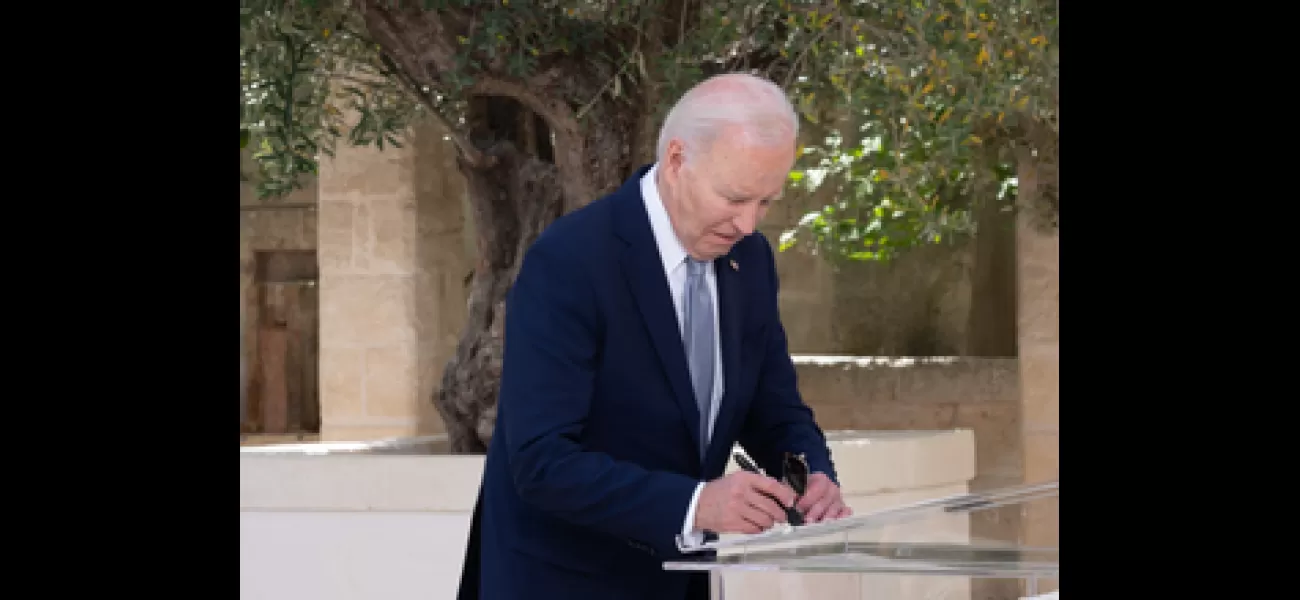Biden creates legislation to protect Tibetan human rights.
Biden signed the Resolve Tibet Act, urging Beijing to peacefully negotiate and support Tibet's struggle for human rights and democracy.
July 13th 2024.

In a statement directed towards Beijing, US President Joe Biden signed the Resolve Tibet Act on Friday, urging for a peaceful resolution through dialogue rather than repression. The law emphasizes that the Tibet issue must be resolved in accordance with international law, through open discussions without any preconditions.
The Act, also known as the Promoting a Resolution to the Tibet-China Dispute Act, also addresses China's falsification of information about Tibet's history. It calls for an end to the spread of misinformation and gives the State Department the responsibility of countering these false claims.
Tencho Gyatso, President of the International Campaign for Tibet, believes that the Resolve Tibet Act addresses the core issue of China's harsh treatment towards Tibetans. He sees it as a symbol of hope for Tibetans and a call for support from other nations in their peaceful struggle for human rights and democratic freedom. To Beijing, it is a clear message that America's support for Tibet is unwavering and that it expects China to resume dialogue and find a solution that respects the fundamental rights of the Tibetan people.
One of the key features of the Act is its recognition of the Tibetan people as a distinct group with their own cultural, linguistic, and historical identity. The law highlights China's systematic suppression of Tibetans, hindering their ability to maintain their way of life. The Dalai Lama has repeatedly urged China to grant genuine autonomy to the Tibetan people, citing international law that recognizes the right to self-determination.
During the Act's passage through Congress, House Foreign Affairs Committee Chairman Michael McCaul expressed his hopes that it would give the Tibetan people control over their own future. Secretary of State Antony Blinken also frequently refers to self-determination as a core principle of American foreign policy. In the past, President Biden has promised to push for negotiations between China and the representatives of the Tibetan people, with the aim of achieving meaningful autonomy, respect for human rights, and the preservation of Tibet's environment and unique cultural heritage.
With the Resolve Tibet Act now in place, the responsibility falls on the State Department and the White House to actively promote genuine negotiations and overcome China's delaying tactics. Tencho Gyatso believes that this is a crucial moment for the Biden administration to follow through on their promise to support the Tibetan people. He believes that experienced State Department officials, such as Special Coordinator for Tibetan Issues Uzra Zeya, now have a valuable tool to elevate their calls for negotiations and fulfill the core objective of their office.
After three years of effort by a select group of members of Congress and the support of Tibet advocates and Tibetan Americans, the Resolve Tibet Act became law. Senior leaders of the Central Tibetan Administration and the International Campaign for Tibet met with Congressional leaders to discuss the situation in Tibet and potential initiatives to help. Representatives Jim McGovern and Michael McCaul took the lead in the House, while Senators Jeff Merkley and Todd Young introduced the bill in the Senate. All four leaders and their staff worked tirelessly to make this law a reality.
The passage of the Resolve Tibet Act was a collaborative effort, with contributions from international law scholars, grassroots advocacy by Tibetan Associations, petitions from ICT members, and record-breaking turnout at Tibet Lobby Day. The Office of Tibet, the International Campaign for Tibet, Students for a Free Tibet, and other prominent Tibet groups also coordinated their efforts to support the Act.
ICT President Tencho Gyatso expressed her admiration for the overwhelming response from people all over the world to the Resolve Tibet Act. She believes that this achievement is a testament to what can be accomplished when citizens, organizations, and dedicated decision-makers come together. She is confident that this accomplishment will pave the way for future progress towards the Tibetan cause, as His Holiness the Dalai Lama says, "change only takes place through action."
Representative Jim McGovern shared his excitement about the Act's passage, stating that it reaffirms America's strong support for the rights of the Tibetan people under international law, including their right to self-determination. He hopes that the Act will restart dialogue between Tibet and China and lead to a resolution of the long-standing dispute over Tibet's autonomy and governance, in line with US policy. He believes that the Tibetan people are ready, and it is now up to the People's Republic of China to come to the table.
Rep. Michael McCaul, who recently visited Dharamsala and met with the Dalai Lama to update him on the progress of the Resolve Tibet Act, highlighted the Act's significance in recognizing Tibet's distinct language, religion, and culture. He believes that the Act will compel the State Department to challenge CCP propaganda about Tibet more aggressively.
Namgyal Choedup, Representative of His Holiness the Dalai Lama and the Central Tibetan Administration to North America, sees the bipartisan and bicameral passage of the Act and its signing into law by President Biden as a tremendous morale boost for the Tibetan people. He believes that this shows the unwavering support of the US government and its people towards the just cause of the Tibetan people. He hopes that this will serve as a reminder to Beijing that the only solution to the Tibet-China dispute is through genuine dialogue and negotiation in good faith.
The 14th Dalai Lama, a symbol of non-violence and compassion, recently celebrated his 89th birthday in the US, where he is recovering from knee surgery.
The Act, also known as the Promoting a Resolution to the Tibet-China Dispute Act, also addresses China's falsification of information about Tibet's history. It calls for an end to the spread of misinformation and gives the State Department the responsibility of countering these false claims.
Tencho Gyatso, President of the International Campaign for Tibet, believes that the Resolve Tibet Act addresses the core issue of China's harsh treatment towards Tibetans. He sees it as a symbol of hope for Tibetans and a call for support from other nations in their peaceful struggle for human rights and democratic freedom. To Beijing, it is a clear message that America's support for Tibet is unwavering and that it expects China to resume dialogue and find a solution that respects the fundamental rights of the Tibetan people.
One of the key features of the Act is its recognition of the Tibetan people as a distinct group with their own cultural, linguistic, and historical identity. The law highlights China's systematic suppression of Tibetans, hindering their ability to maintain their way of life. The Dalai Lama has repeatedly urged China to grant genuine autonomy to the Tibetan people, citing international law that recognizes the right to self-determination.
During the Act's passage through Congress, House Foreign Affairs Committee Chairman Michael McCaul expressed his hopes that it would give the Tibetan people control over their own future. Secretary of State Antony Blinken also frequently refers to self-determination as a core principle of American foreign policy. In the past, President Biden has promised to push for negotiations between China and the representatives of the Tibetan people, with the aim of achieving meaningful autonomy, respect for human rights, and the preservation of Tibet's environment and unique cultural heritage.
With the Resolve Tibet Act now in place, the responsibility falls on the State Department and the White House to actively promote genuine negotiations and overcome China's delaying tactics. Tencho Gyatso believes that this is a crucial moment for the Biden administration to follow through on their promise to support the Tibetan people. He believes that experienced State Department officials, such as Special Coordinator for Tibetan Issues Uzra Zeya, now have a valuable tool to elevate their calls for negotiations and fulfill the core objective of their office.
After three years of effort by a select group of members of Congress and the support of Tibet advocates and Tibetan Americans, the Resolve Tibet Act became law. Senior leaders of the Central Tibetan Administration and the International Campaign for Tibet met with Congressional leaders to discuss the situation in Tibet and potential initiatives to help. Representatives Jim McGovern and Michael McCaul took the lead in the House, while Senators Jeff Merkley and Todd Young introduced the bill in the Senate. All four leaders and their staff worked tirelessly to make this law a reality.
The passage of the Resolve Tibet Act was a collaborative effort, with contributions from international law scholars, grassroots advocacy by Tibetan Associations, petitions from ICT members, and record-breaking turnout at Tibet Lobby Day. The Office of Tibet, the International Campaign for Tibet, Students for a Free Tibet, and other prominent Tibet groups also coordinated their efforts to support the Act.
ICT President Tencho Gyatso expressed her admiration for the overwhelming response from people all over the world to the Resolve Tibet Act. She believes that this achievement is a testament to what can be accomplished when citizens, organizations, and dedicated decision-makers come together. She is confident that this accomplishment will pave the way for future progress towards the Tibetan cause, as His Holiness the Dalai Lama says, "change only takes place through action."
Representative Jim McGovern shared his excitement about the Act's passage, stating that it reaffirms America's strong support for the rights of the Tibetan people under international law, including their right to self-determination. He hopes that the Act will restart dialogue between Tibet and China and lead to a resolution of the long-standing dispute over Tibet's autonomy and governance, in line with US policy. He believes that the Tibetan people are ready, and it is now up to the People's Republic of China to come to the table.
Rep. Michael McCaul, who recently visited Dharamsala and met with the Dalai Lama to update him on the progress of the Resolve Tibet Act, highlighted the Act's significance in recognizing Tibet's distinct language, religion, and culture. He believes that the Act will compel the State Department to challenge CCP propaganda about Tibet more aggressively.
Namgyal Choedup, Representative of His Holiness the Dalai Lama and the Central Tibetan Administration to North America, sees the bipartisan and bicameral passage of the Act and its signing into law by President Biden as a tremendous morale boost for the Tibetan people. He believes that this shows the unwavering support of the US government and its people towards the just cause of the Tibetan people. He hopes that this will serve as a reminder to Beijing that the only solution to the Tibet-China dispute is through genuine dialogue and negotiation in good faith.
The 14th Dalai Lama, a symbol of non-violence and compassion, recently celebrated his 89th birthday in the US, where he is recovering from knee surgery.
[This article has been trending online recently and has been generated with AI. Your feed is customized.]
[Generative AI is experimental.]
0
0
Submit Comment





